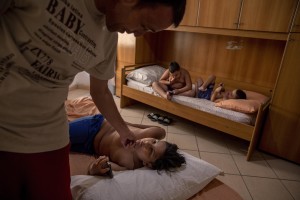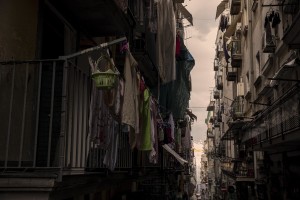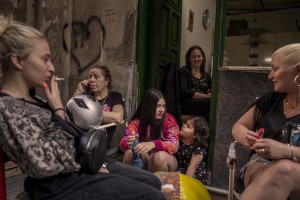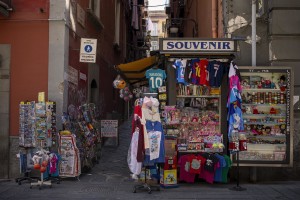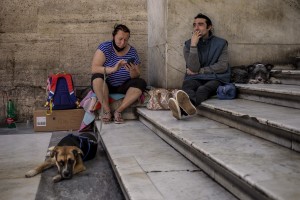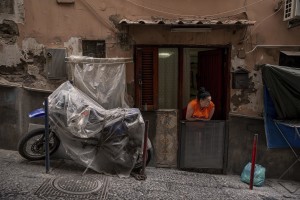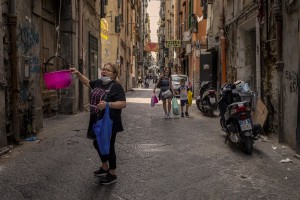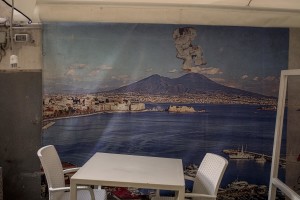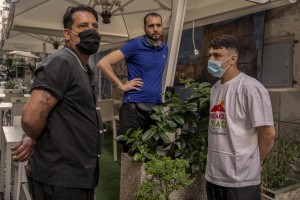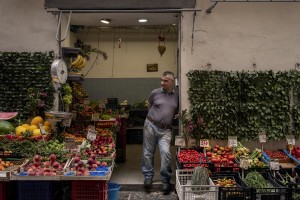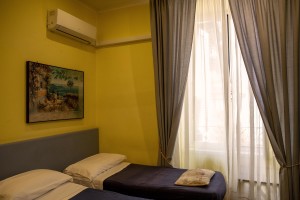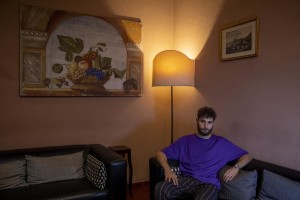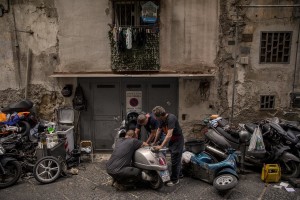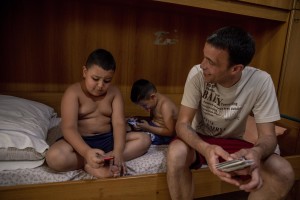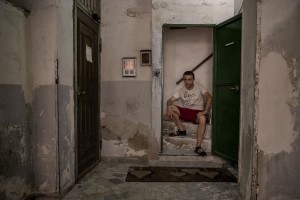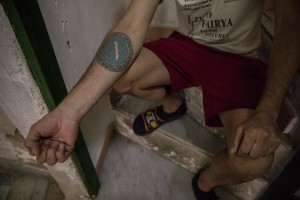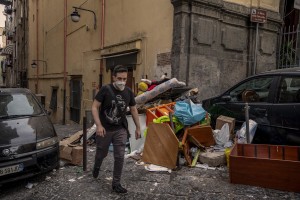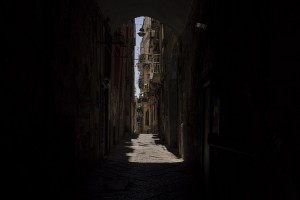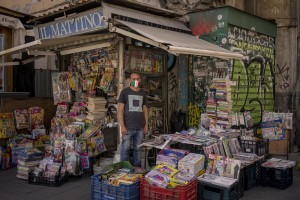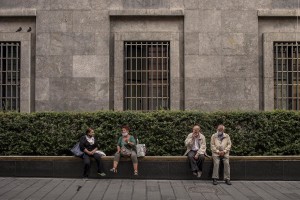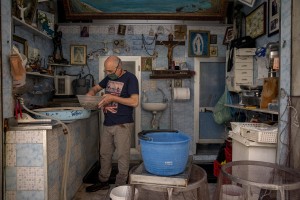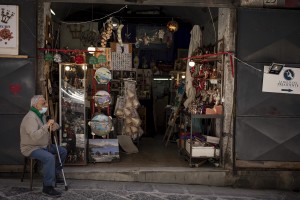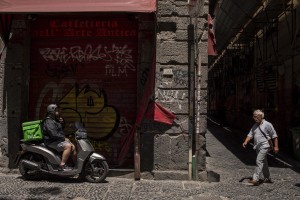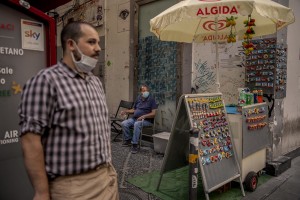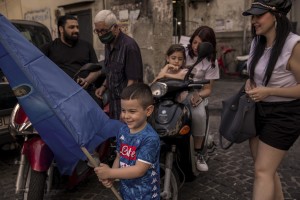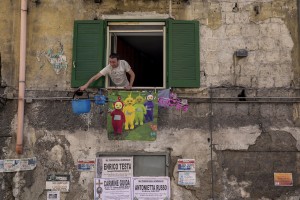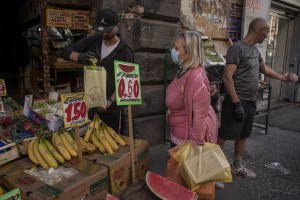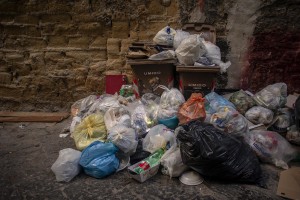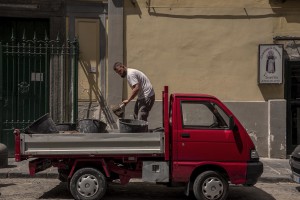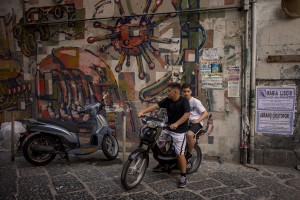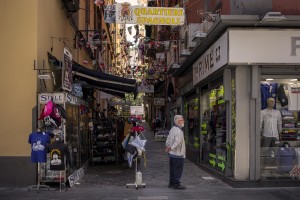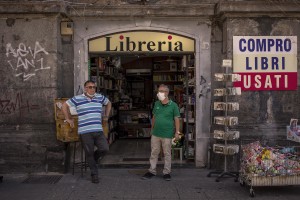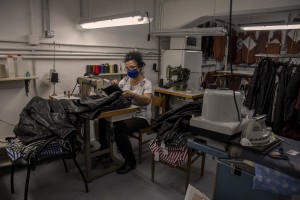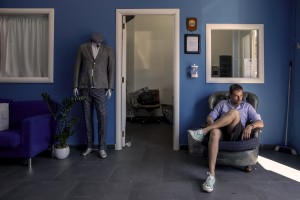According to OECD (Organization for Economic Cooperation and Development) estimates, Italy is among the most affected four countries in the world by the economic crisis triggered by the coronavirus together with Spain, France, and the United Kingdom. These are the estimates of a report that takes into account the only economic impact of the pandemic, without taking into account the number of victims and infections reported in individual countries. In Italy there are those who have been forced by the lockdown to close their business and have no longer been able to reopen it, those who have succeeded but those who no longer have a job, those who are on layoffs. A dramatic situation and the risk of depression that is advancing with great strides so that the World Health Organization believes that the Coronavirus emergency also affects mental health.

Gaetano Ippolito, 46 years old caress his son Christian, 10 years old while his other two children Ciro, 7 years old and Diego, 5 years play with their smartphone on the bed in the house where they live in the “Rione Sanità” in Naples, Italy on June 17, 2020. Since the pandemic broke out, Gaetano has no longer been able to find any type of job, even on an occasional basis. Popular neighborhoods are those that more than others are suffering from the economic crisis generated by the coronavirus. The rate of poverty and unemployment that was higher than the national average in Southern Italy even before the pandemic, increased following the lockdown imposed by the government to counter the spread of the coronavirus, which blocked the country’s economy for more than two months.

A general view of the “Quartieri Spagnoli” in Naples, Italy on June 16, 2020. Popular neighborhoods are those that more than others are suffering from the economic crisis generated by the coronavirus. The rate of poverty and unemployment that was higher than the national average in Southern Italy even before the pandemic, increased following the lockdown imposed by the government to counter the spread of the coronavirus, which blocked the country’s economy for more than two months.

Women and girls are seen outside a typical Neapolitan house called “basso” in the “Quartieri Spagnoli” in Naples, Italy on June 16, 2020. Popular neighborhoods are those that more than others are suffering from the economic crisis generated by the coronavirus. The rate of poverty and unemployment that was higher than the national average in Southern Italy even before the pandemic, increased following the lockdown imposed by the government to counter the spread of the coronavirus, which blocked the country’s economy for more than two months.

A newsstand without customers is seen in Toledo street in Naples, Italy on June 15, 2020. Popular neighborhoods are those that more than others are suffering from the economic crisis generated by the coronavirus. The rate of poverty and unemployment that was higher than the national average in Southern Italy even before the pandemic, increased following the lockdown imposed by the government to counter the spread of the coronavirus, which blocked the country’s economy for more than two months.

Homeless and their dogs are see inside the Umberto I gallery in Naples, Italy on June 15, 2020. During the lockdown imposed by the Italian government to contain the spread of coronavirus, homeless experienced a double emergency: the first one due to their condition, the second one linked to the closure of many assistance centers because of possible contagion.

A women is seen inside a typical Neapolitan house called “basso” in the “Quartieri Spagnoli” in Naples, Italy on June 16, 2020.Popular neighborhoods are those that more than others are suffering from the economic crisis generated by the coronavirus. The rate of poverty and unemployment that was higher than the national average in Southern Italy even before the pandemic, increased following the lockdown imposed by the government to counter the spread of the coronavirus, which blocked the country’s economy for more than two months.

A woman takes items from a basket in the “Quartieri Spagnoli” in Naples, Italy on June 16, 2020. Popular neighborhoods are those that more than others are suffering from the economic crisis generated by the coronavirus. The rate of poverty and unemployment that was higher than the national average in Southern Italy even before the pandemic, increased following the lockdown imposed by the government to counter the spread of the coronavirus, which blocked the country’s economy for more than two months.

A poster depicting Mount Vesuvius is seen outside a pizzeria in the “Quartieri Spagnoli” in Naples, Italy on June 16, 2020. Popular neighborhoods are those that more than others are suffering from the economic crisis generated by the coronavirus. The rate of poverty and unemployment that was higher than the national average in Southern Italy even before the pandemic, increased following the lockdown imposed by the government to counter the spread of the coronavirus, which blocked the country’s economy for more than two months.

From left: Alessandro, Emanuele and Antonio are seen outside the pizzeria where they work in the “Quartieri Spagnoli” in Naples, Italy on June 16, 2020. Popular neighborhoods are those that more than others are suffering from the economic crisis generated by the coronavirus. The rate of poverty and unemployment that was higher than the national average in Southern Italy even before the pandemic, increased following the lockdown imposed by the government to counter the spread of the coronavirus, which blocked the country’s economy for more than two months.

A greengrocer in the “Quartieri Spagnoli” in Naples, Italy on June 16, 2020. Popular neighborhoods are those that more than others are suffering from the economic crisis generated by the coronavirus. The rate of poverty and unemployment that was higher than the national average in Southern Italy even before the pandemic, increased following the lockdown imposed by the government to counter the spread of the coronavirus, which blocked the country’s economy for more than two months.

A room of the Toledo hotel in Naples, Italy on July 9, 2020. The Toledo hotel located in the heart of the “Quartieri Spagnoli”, welcomed the last customer on March 10,2020 and then remained closed for three months due to the restrictive measures imposed by the Italian government to reduce the spread of the coronavirus. The tourism sector remains among those most affected by the pandemic.

A portrait of Sergio Cafora, 23 years old and manager of the Toledo hotel in Naples, Italy on July 9, 2020. The Toledo hotel located in the heart of the “Quartieri Spagnoli”, welcomed the last customer on March 10,2020 and then remained closed for three months due to the restrictive measures imposed by the Italian government to reduce the spread of the coronavirus. The tourism sector remains among those most affected by the pandemic.

Mechanics at work in the “Quartieri Spagnoli” in Naples, Italy on June 16, 2020. Popular neighborhoods are those that more than others are suffering from the economic crisis generated by the coronavirus. The rate of poverty and unemployment that was higher than the national average in Southern Italy even before the pandemic, increased following the lockdown imposed by the government to counter the spread of the coronavirus, which blocked the country’s economy for more than two months.

Gaetano Ippolito (right) 46 years old is seen with his sons Ciro (left) 7 years old and Diego (center) 5 years old in the house where they live in the “Rione Sanità” in Naples, Italy on June 17, 2020. Since the pandemic broke out, Gaetano has no longer been able to find any type of job, even on an occasional basis. Popular neighborhoods are those that more than others are suffering from the economic crisis generated by the coronavirus. The rate of poverty and unemployment that was higher than the national average in Southern Italy even before the pandemic, increased following the lockdown imposed by the government to counter the spread of the coronavirus, which blocked the country’s economy for more than two months.

Gaetano Ippolito, 46 years old is portrayed at the entrance of his house in the “Rione Sanità” in Naples, Italy on June 17, 2020. Since the pandemic broke out, Gaetano has no longer been able to find any type of job, even on an occasional basis. Popular neighborhoods are those that more than others are suffering from the economic crisis generated by the coronavirus. The rate of poverty and unemployment that was higher than the national average in Southern Italy even before the pandemic, increased following the lockdown imposed by the government to counter the spread of the coronavirus, which blocked the country’s economy for more than two months.

Gaetano Ippolito, 46 years old shows a tattoo depicting the logo of Napoli soccer in the “Rione Sanità” in Naples, Italy on June 17, 2020. Since the pandemic broke out, Gaetano has no longer been able to find any type of job, even on an occasional basis. Popular neighborhoods are those that more than others are suffering from the economic crisis generated by the coronavirus. The rate of poverty and unemployment that was higher than the national average in Southern Italy even before the pandemic, increased following the lockdown imposed by the government to counter the spread of the coronavirus, which blocked the country’s economy for more than two months.

A boy walks among the garbage in the “Quartieri Spagnoli” in Naples, Italy on June 16, 2020. Popular neighborhoods are those that more than others are suffering from the economic crisis generated by the coronavirus. The rate of poverty and unemployment that was higher than the national average in Southern Italy even before the pandemic, increased following the lockdown imposed by the government to counter the spread of the coronavirus, which blocked the country’s economy for more than two months.

A general view of the historical center of Naples, Italy on June 15, 2020.

Vincenzo 39 years old, is portrayed outside his newsstand in Dante square in Naples, Italy on June 15, 2020. That of newsagents is one of the few categories that has not been affected by the economic crisis generated during the coronavirus in Italy, because even during the locdown it was allowed to remain open.

People are seen in Toledo steet in Naples, Italy on June 16, 2020. Popular neighborhoods are those that more than others are suffering from the economic crisis generated by the coronavirus. The rate of poverty and unemployment that was higher than the national average in Southern Italy even before the pandemic, increased following the lockdown imposed by the government to counter the spread of the coronavirus, which blocked the country’s economy for more than two months.

Vincenzo, 64 years old is seen at work inside his fish shop in the “Rione Sanità” in Naples, Italy on June 17, 2020. Popular neighborhoods are those that more than others are suffering from the economic crisis generated by the coronavirus. The rate of poverty and unemployment that was higher than the national average in Southern Italy even before the pandemic, increased following the lockdown imposed by the government to counter the spread of the coronavirus, which blocked the country’s economy for more than two months.

Figurines featuring famous people are seen outside a store in San Gregorio Armeno street in Naples, Southern Italy on June 16, 2020. San Gregorio Armeno is the undisputed world capital of the nativity and home to the artisans and merchants who specialize in the art of the Neapolitan presepe. During the whole year million tourists come to see these traditional shops and buy the original miniature figurines, but due to the spread of the coronavirus this type of tourism and business have stopped.

A man is seen outside a shop in San Gregorio Armeno street in Naples, Southern Italy on June 16, 2020. San Gregorio Armeno is the undisputed world capital of the nativity and home to the artisans and merchants who specialize in the art of the Neapolitan presepe. During the whole year million tourists come to see these traditional shops and buy the original miniature figurines, but due to the spread of the coronavirus this type of tourism and business have stopped.

A rider (left) and a man (right) are seen in a street of the historical center of Naples, Italy on June 15, 2020.

A waiter (left) and a peddler (right) are seen in the “Quartieri Spagnoli” in Naples, Italy on June 16, 2020. Popular neighborhoods are those that more than others are suffering from the economic crisis generated by the coronavirus. The rate of poverty and unemployment that was higher than the national average in Southern Italy even before the pandemic, increased following the lockdown imposed by the government to counter the spread of the coronavirus, which blocked the country’s economy for more than two months.

People are seen in the “Rione Sanità” in Naples, Italy on June 17, 2020. Popular neighborhoods are those that more than others are suffering from the economic crisis generated by the coronavirus. The rate of poverty and unemployment that was higher than the national average in Southern Italy even before the pandemic, increased following the lockdown imposed by the government to counter the spread of the coronavirus, which blocked the country’s economy for more than two months.

Gaetano Ippolito, 46 years old looking out the window of the house where he lives in the “Rione Sanità” in Naples, Italy on June 17, 2020. Since the pandemic broke out, Gaetano has no longer been able to find any type of job, even on an occasional basis. Popular neighborhoods are those that more than others are suffering from the economic crisis generated by the coronavirus. The rate of poverty and unemployment that was higher than the national average in Southern Italy even before the pandemic, increased following the lockdown imposed by the government to counter the spread of the coronavirus, which blocked the country’s economy for more than two months.

Ciro Romeo, 37 years old is seen at work inside his fruit and vegetable shop in the “Rione Sanità” in Naples, Italy on June 17, 2020. Popular neighborhoods are those that more than others are suffering from the economic crisis generated by the coronavirus. The rate of poverty and unemployment that was higher than the national average in Southern Italy even before the pandemic, increased following the lockdown imposed by the government to counter the spread of the coronavirus, which blocked the country’s economy for more than two months.

Garbage is seen in a street of the “Rione Sanità” in Naples, Italy on June 17, 2020. Popular neighborhoods are those that more than others are suffering from the economic crisis generated by the coronavirus. The rate of poverty and unemployment that was higher than the national average in Southern Italy even before the pandemic, increased following the lockdown imposed by the government to counter the spread of the coronavirus, which blocked the country’s economy for more than two months.

A man at work in the “Rione Sanità” in Naples, Italy on June 17, 2020. Popular neighborhoods are those that more than others are suffering from the economic crisis generated by the coronavirus. The rate of poverty and unemployment that was higher than the national average in Southern Italy even before the pandemic, increased following the lockdown imposed by the government to counter the spread of the coronavirus, which blocked the country’s economy for more than two months.

Two kids are seen on a scooter in a street of the “Rione Sanità” in Naples, Italy on June 17, 2020. Popular neighborhoods are those that more than others are suffering from the economic crisis generated by the coronavirus. The rate of poverty and unemployment that was higher than the national average in Southern Italy even before the pandemic, increased following the lockdown imposed by the government to counter the spread of the coronavirus, which blocked the country’s economy for more than two months.

A man is seen in a street of of the “Quartieri Spagnoli” in Naples, Italy on June 15, 2020. Popular neighborhoods are those that more than others are suffering from the economic crisis generated by the coronavirus. The rate of poverty and unemployment that was higher than the national average in Southern Italy even before the pandemic, increased following the lockdown imposed by the government to counter the spread of the coronavirus, which blocked the country’s economy for more than two months.

Two men are seen outside a library in Dante square in Naples, Southern Italy on June 15, 2020.

A corner of the “GF” factory in Naples, Italy on June 30, 2020. The “GF” is an Italian factory that produces leather clothing and tailored suits. After the end of the lockdown and the consequent reopening of commercial activities, the “GF” factory saw its revenues drop by almost 50% and was forced to put some employees into layoffs.

A woman at work inside the “GF” factory in Naples, Italy on June 30, 2020. The “GF” is an Italian factory that produces leather clothing and tailored suits. After the end of the lockdown and the consequent reopening of commercial activities, the “GF” factory saw its revenues drop by almost 50% and was forced to put some employees into layoffs.

A man sits on a sofa of the “GF” factory in Naples, Italy on June 30, 2020. The “GF” is an Italian factory that produces leather clothing and tailored suits. After the end of the lockdown and the consequent reopening of commercial activities, the “GF” factory saw its revenues drop by almost 50% and was forced to put some employees into layoffs.

Masks produced by “GF” factory in Naples, Italy on June 30, 2020. The “GF” is an Italian factory that produces leather clothing and tailored suits. After the end of the lockdown and the consequent reopening of commercial activities, the “GF” factory saw its revenues drop by almost 50% and was forced to put some employees into layoffs.
